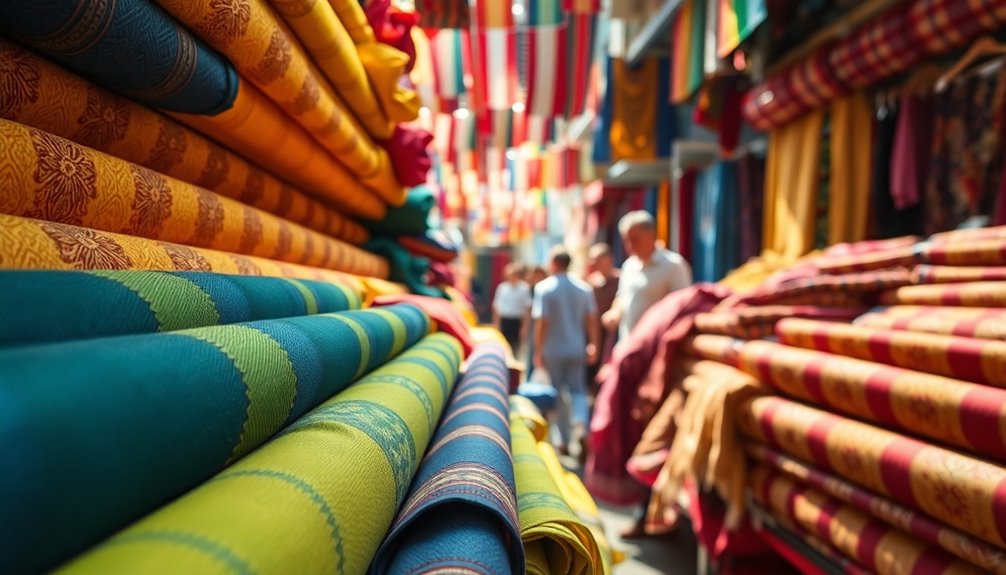Türkiye's fabric imports from Malaysia have seen an impressive 20% increase, pushing the total projected value to $128 million in 2024. This surge reflects Türkiye's growing textile industry, which is vital for its economy. As the country continues to strengthen its trade relationships, especially in textiles, this growth indicates a positive trend for both nations. If you want to understand more about how this impacts the textile market, you won't want to miss what comes next.
Key Takeaways
- Türkiye's fabric imports from Malaysia saw a 20% increase, reflecting growing trade ties between the two countries.
- The projected total imports from Malaysia for 2024 are set at $128 million, indicating robust demand.
- This rise in imports aligns with Türkiye's export-oriented strategy in the textile industry.
- Malaysia's knitted or crocheted fabric exports to Türkiye were valued at $351.09 thousand in 2023.
- The trade balance is crucial for both Türkiye and Malaysia's economic landscapes, enhancing mutual economic growth.

As Türkiye's textile industry continues to thrive, its fabric imports from Malaysia play a vital role in shaping trade dynamics between the two countries. You'll find that Türkiye's rich textile history dates back to the Ottoman Empire, and this legacy contributes significantly to its current status as a major textile exporter. Since 2000, Türkiye's textile exports have tripled, thanks to technological innovations and strategic investments that have enhanced production efficiency. By 2022, Türkiye ranked as the fourth-largest textile exporter globally, accounting for over 4% of the world's total textile exports.
Türkiye's textile industry thrives on a rich history, bolstered by innovative investments and significant export growth since 2000.
In 2023, Turkey imported $351.09 thousand worth of knitted or crocheted fabrics from Malaysia. This figure reflects a growing relationship, as you're witnessing a 20% rise in Türkiye's fabric imports from Malaysia, pushing the total to $128 million in 2024. The trade balance is essential, considering Malaysia's overall economic landscape, where trade dynamics can be complex. In 2023, Malaysia's total imports were registered at MYR 119,341.00 Million.
With Türkiye's export-oriented strategy, you can see how this influences its trade relationships, particularly with countries like Malaysia. Both nations face stiff competition from other textile-producing countries, which complicates their trade dynamics. Türkiye's textile sector benefits from foreign investments and government mandates that encourage reinvestment into research and development.
Improvements in supply chain management also help Turkish companies manage costs effectively. However, high energy costs remain a challenge, impacting production costs and competitiveness.
Looking ahead, technological advancements will likely continue to drive growth in the Turkish textile sector, while free-trade agreements will facilitate further market expansion. However, you should keep in mind that competition from countries like Bangladesh and India poses a significant challenge to both Türkiye and Malaysia.
Sustainability efforts will be crucial for future success, as the industry increasingly focuses on managing its environmental impact while meeting market demands.
Frequently Asked Questions
What Types of Fabric Are Imported From Malaysia to Turkiye?
You'll find that Turkiye imports a variety of fabrics from Malaysia, including polyester fabrics, which are popular for apparel and home textiles.
PU fabric and coated textiles, like polyurethane laminates, are also significant imports.
Additionally, dipped polyester fabric is valued for its versatility in clothing and upholstery.
The demand for synthetic fibers remains high due to their durability and cost-effectiveness, reflecting Malaysia's diverse textile offerings.
How Does This Rise Affect Local Fabric Manufacturers in Turkiye?
As if the fabric market's a bustling bazaar, the rise in imports from Malaysia shakes things up for you, a local fabric manufacturer.
Increased competition means you might face price pressure, forcing you to enhance quality and innovate. You could see a shift in market share, impacting your revenue.
To thrive, consider diversifying your product line, improving efficiency, and exploring niche markets, ensuring you stand out amidst the influx of cheaper imports.
What Are the Main Reasons for the Increase in Fabric Imports?
The increase in fabric imports primarily stems from several key factors.
You'll notice that trade agreements make Malaysian fabrics more attractive due to lower tariffs.
Rising demand in Turkiye's textile industry drives imports, while competitive pricing from Malaysia offers better options.
Additionally, as you seek to diversify suppliers, the reliable supply chain and manufacturing capacity in Malaysia ensure a steady flow of quality fabrics to meet your market needs.
How Do Tariffs Impact Fabric Import Costs Between Turkiye and Malaysia?
Tariffs significantly impact fabric import costs between Turkiye and Malaysia.
By eliminating duties on a vast majority of tariff lines under the MTFTA, you can benefit from zero tariffs on certain textile products. This gives Malaysian exporters a competitive advantage, while increased tariffs on non-FTA imports raise costs for Turkish manufacturers.
Consequently, you'll see a shift in market dynamics, favoring imports from Malaysia and encouraging strategic sourcing to optimize costs.
What Trends Are Expected in Future Fabric Trade Between These Countries?
"Where there's a will, there's a way."
In the future, you can expect fabric trade between Turkey and Malaysia to evolve significantly.
Trends like sustainability will drive demand for eco-friendly fabrics, while digitalization will enhance manufacturing efficiency.
As Turkish companies adapt to changing consumer preferences and market dynamics, you'll see increased competition and innovation.
Additionally, diversifying export markets will help both countries navigate fluctuations in trade volumes and strengthen their economic ties.
Conclusion
In 2024, Turkiye's fabric imports from Malaysia soared by 20%, reaching an impressive $128 million. This increase highlights the growing demand for Malaysian textiles in the Turkish market. Did you know that Malaysia ranks among the top five suppliers of fabric to Turkiye? This statistic underscores the importance of international trade relationships and the potential for further growth in the textile industry. With such trends, it's exciting to see how both countries will evolve their collaboration in the future!









